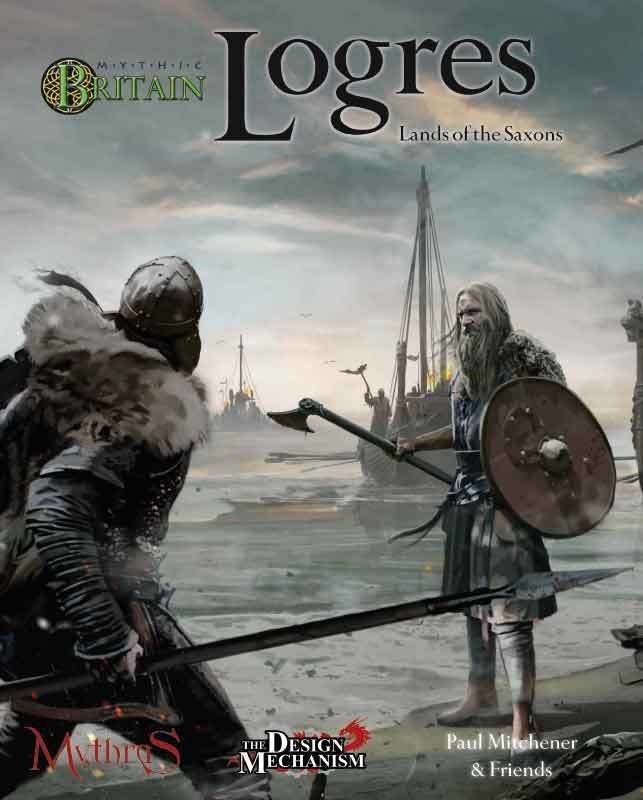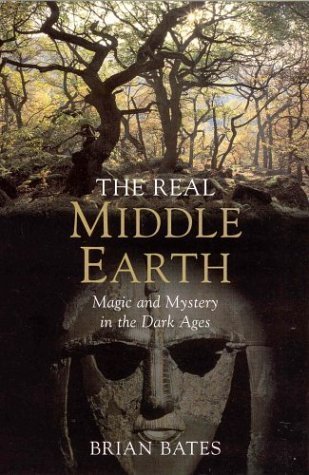This post collects two short book reviews about Anglo-Saxon mystical thought by University of Sussex professor of psychology and shamanic studies, Brian Bates, a respected authority in the field.
If you're coming to this book because of a love of Tolkien, however, I should provide a few words of caution. The title is clearly a gimmick to tap in on the popularity of the movies, which were being released when this book was published. The author does mention Tolkien and how he was inspired by Saxon lore, but maybe only once every 2 chapters - just enough to make sense of the title. Tolkien is obviously not the thrust of the book, though Tolkien fans would still find it interesting, I think, as long as their expectations are properly set.
I recommend it as a starting point for anyone interested in reading up on the spiritual thinking of past people. Lastly, it strays from time to time into self-indulgence, enough to make me wince, but not enough to mar the overall book. As a companion to running a mythic role-playing game, it's just about perfect.
The Way of Wyrd: Tales of an Anglo-Saxon Sorcerer
 Since I mentioned this above as a sourcebook for playing a Saxons campaign, I thought I'd say a few more words about this product.
Since I mentioned this above as a sourcebook for playing a Saxons campaign, I thought I'd say a few more words about this product.
Mythic Britain: Logres is a supplement by Paul Mitchener for the Mythic Britain setting (itself written by Lawrence Whitaker) for the Mythras game system. It takes the setting of Mythic Britain, rolls it over, and gives it back to us from the viewpoint of the Saxons. Logres, by the way, is the Brythonic name for the "lost lands" that the Saxons now control.
The book contains chapters on Saxon culture, spirits and magic, character creation, Saxon lands and settlements, and key personages acting in the Saxon lands. There're are also 4 scenarios that link together into a short campaign for 4-8 sessions of play (or, if your group is like mine, 12 sessions of play).
More about Brian Bates from Wikipedia
The Real Middle Earth: Magic and Mystery in the Dark Ages
The Real Middle Earth: Magic and Mystery in the Dark Ages
by Brian Bates, 2003, 292 pages
This is a survey-level book about the mystical aspect of Anglo-Saxon culture and it is just loaded with interesting little bits of mythical Saxon lore. Here's a look at some of what it covers:
- Saxon cosmology
- The people of the dark ages (the author sees the Celts, Germanic tribes, and Norse as part of a pan-European culture)
- How they lived
- Their perception of forests
- Their reaction to what the Romans left behind
- Dragon and their lairs
- Treasure hoards
- Elf shot
- Herbalism
- Spirits
- Wells and waterways
- Corvids
- Omens
- Shape changers
- Voyaging to the spirit world
- Wyrd, and those who weave it and can read it.
- Giants
- Dwarven craftsmanship
- Magical bonds
- Shamanic initiation (and spiders)
- The journey of the dead.

If your a gamer looking to play, for example, Mythic Britain: Logres - you'll probably find this book to be a wonderful companion. If you're familiar with the Mythras game system, you'll find yourself nodding your head a lot as the author describes the ways of the Shaman, and you'll find some new things to think about too. I can also see it being useful to Ars Magica players interested in older magic traditions, perhaps for giving your Ex Miscellanea mage or a local hedge wizard a bit of flavour.
If you're coming to this book because of a love of Tolkien, however, I should provide a few words of caution. The title is clearly a gimmick to tap in on the popularity of the movies, which were being released when this book was published. The author does mention Tolkien and how he was inspired by Saxon lore, but maybe only once every 2 chapters - just enough to make sense of the title. Tolkien is obviously not the thrust of the book, though Tolkien fans would still find it interesting, I think, as long as their expectations are properly set.
I recommend it as a starting point for anyone interested in reading up on the spiritual thinking of past people. Lastly, it strays from time to time into self-indulgence, enough to make me wince, but not enough to mar the overall book. As a companion to running a mythic role-playing game, it's just about perfect.
The Way of Wyrd: Tales of an Anglo-Saxon Sorcerer
by Brian Bates, 1983, 237 pages
This book was recommended to me by my friend Paul as a follow-up on The Real Middle Earth.
The Way of the Wyrd is a fiction that follows the fortunes of Wat Brand, a scribe in a Christian mission in Saxon-era Mercia, as he is sent into deepest, darkest Sussex to learn the ways of the pagan Saxons who live there. He's told that a guide will meet him, and that guide is Wulf, a Saxon sorcerer, who takes him under his wing and teaches him to open himself to the spirit world.
It's easy to see how this book influenced the later Real Middle Earth, which is much more like a concrete survey of Anglo-Saxon mystical thinking. In this book we encounter many of the same ideas, but here presented in a much more dreamlike story format. It is very much as if the teaching in this earlier book is intended to be from heart to heart, while that in the latter book is from mind to mind. Personally, I respond much more strongly to the latter, and TWoW had me often asking myself "why is this happening, exactly?", but Bates is an eloquent writer and the prose zips along so, despite confounding the rationalist in me, it was a pleasant read.
Recommended for anyone into spiritual customs. Prepare to be baffled if you run mostly on logic, though.
As an aside, this book has inspired several pieces of music, including the thrash metal album Dreamweaver by Sabbat and many much more mellow pieces. There's definitely something to be said for a book that can inspire so much creativity.
The Way of the Wyrd is a fiction that follows the fortunes of Wat Brand, a scribe in a Christian mission in Saxon-era Mercia, as he is sent into deepest, darkest Sussex to learn the ways of the pagan Saxons who live there. He's told that a guide will meet him, and that guide is Wulf, a Saxon sorcerer, who takes him under his wing and teaches him to open himself to the spirit world.
It's easy to see how this book influenced the later Real Middle Earth, which is much more like a concrete survey of Anglo-Saxon mystical thinking. In this book we encounter many of the same ideas, but here presented in a much more dreamlike story format. It is very much as if the teaching in this earlier book is intended to be from heart to heart, while that in the latter book is from mind to mind. Personally, I respond much more strongly to the latter, and TWoW had me often asking myself "why is this happening, exactly?", but Bates is an eloquent writer and the prose zips along so, despite confounding the rationalist in me, it was a pleasant read.
Recommended for anyone into spiritual customs. Prepare to be baffled if you run mostly on logic, though.
As an aside, this book has inspired several pieces of music, including the thrash metal album Dreamweaver by Sabbat and many much more mellow pieces. There's definitely something to be said for a book that can inspire so much creativity.
Mythic Britain: Logres
 Since I mentioned this above as a sourcebook for playing a Saxons campaign, I thought I'd say a few more words about this product.
Since I mentioned this above as a sourcebook for playing a Saxons campaign, I thought I'd say a few more words about this product.Mythic Britain: Logres is a supplement by Paul Mitchener for the Mythic Britain setting (itself written by Lawrence Whitaker) for the Mythras game system. It takes the setting of Mythic Britain, rolls it over, and gives it back to us from the viewpoint of the Saxons. Logres, by the way, is the Brythonic name for the "lost lands" that the Saxons now control.
The book contains chapters on Saxon culture, spirits and magic, character creation, Saxon lands and settlements, and key personages acting in the Saxon lands. There're are also 4 scenarios that link together into a short campaign for 4-8 sessions of play (or, if your group is like mine, 12 sessions of play).

I remember reading The Way of Wyrd many years ago, probably not long after it came out, and at the time it struck me as very derivative from the Carlos Castaneda series. This could potentially because of common ground between different world shamanistic traditions, but it lessened the book for me, and I haven't read it since. Might be interesting to reread now and see what I think all these years later!
ReplyDeleteGiven the relative ages it seems likely one would be inspired by the other. If you do re-read, let me know how it goes.
ReplyDelete